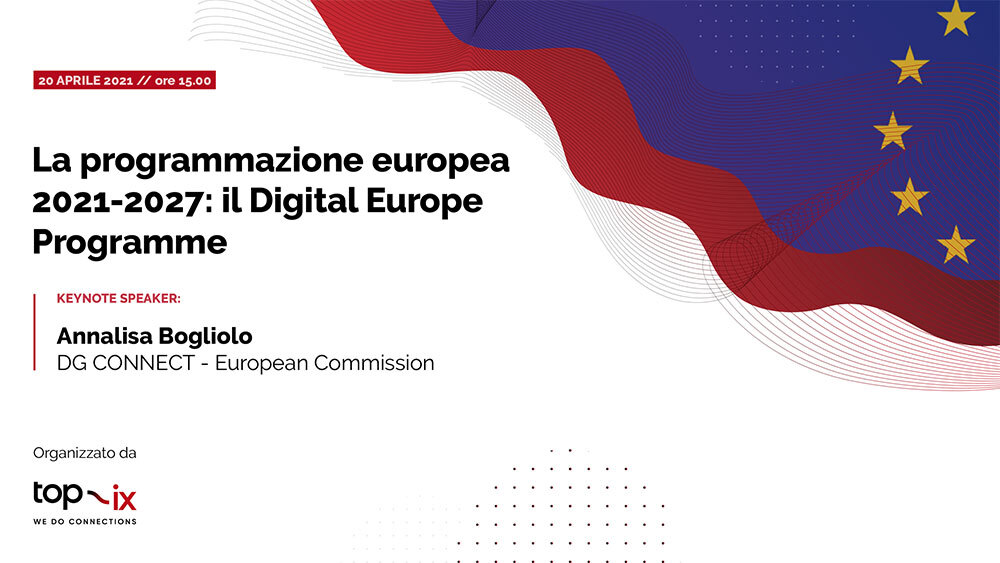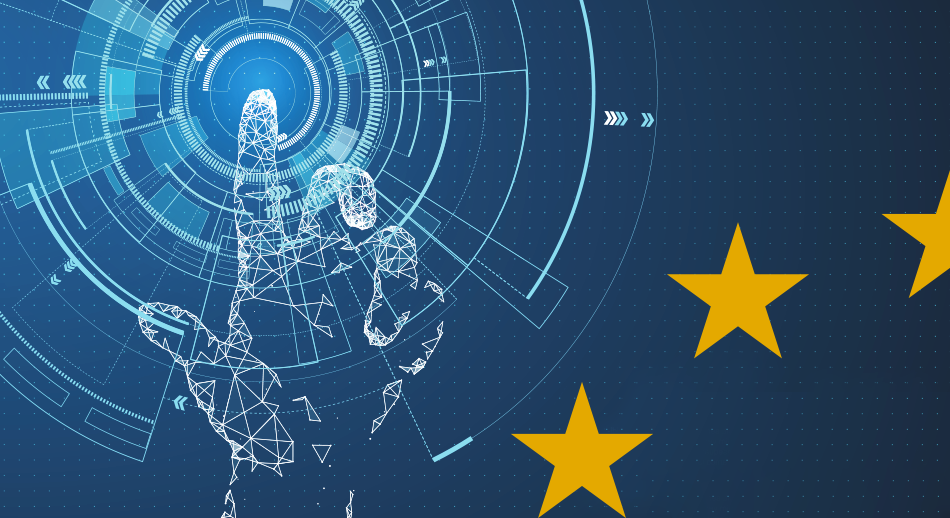Digital Europe Program is one of the new features of the new programming period: all available documents and an in-depth seminar on the 2021-2022 work plan.
Digital Europe: a new program to meet the EU’s digital challenges
Digital Europe-or in Italian, Europa Digitale-is one of the new features of the new programming period. Along with Europe’s “GreenDeal,” the “digital transition” is the EU’s top strategic priority for the coming years, referred to as Europe’s “Digital Decade.” Not surprisingly, theRecovery Instrument devotes a minimum threshold of 37 percent and 20 percent of funds to these two priorities, respectively.
The main objectives of the EU’s “digital transition” strategy(recently presented by the European Commission) are detailed in precise indicators, divided into four groups:
- Skills:Availability of 20 million ICT specialists (gender balanced) in Europe;80% of the European population with basic ICT skills;
- Infrastructure:Gigabit connectivity for all and 5G everywhere;Doubling the EU’s share of cutting-edge semiconductor production;10,000 edge data and cloud nodes;First European quantum-accelerated computer;
- Digital transformation of enterprises:Use of cloud/IA/Big Data by 75% of enterprises;Doubling of“unicorn” tech enterprises;90% of SMEs with basic digital intensity;
- Digitization of public services:Core public services 100% online;Medical records available 100% online;Digital ID use by 80% citizens.
Digital Europe is not, by any means, a “new program,” because it complements and deepens what has been done so far, and will continue to be done, under other major European programs, such as Horizon Europe and Connecting Europe Facility, with which Digital Europe will operate in synergy. However, it presents some major innovations as a result of its ambitious strategic goals.
Digital Europe program: the main features
With a total budget of 7.5 billion euros, Digital Europe is rightfully among the “big European programs” of this seven-year period. In line with the above objectives, the program aims to build the EU’s strategic digital capabilities and facilitate the deployment of digital technologies. Identify the following areas as priorities:
- Supercomputing (€2.2 billion): strengthening the EU’s supercomputing and data processing capabilities by purchasing supercomputers and expanding their use in areas of public interest;
- Artificial Intelligence (AI) (€2.1 billion): testing AI in strategic areas and promoting its use by business and government, with space and infrastructure for data management;
- Cybersecurity (1.6 billion): promoting coordination between data tools and infrastructure and enhancing cybersecurity and network security at all levels (infrastructure, institutions, private sector, economy);
- Advanced digital skills. (0.6 billion): programs, internships and continuing education for experts in priority areas (data and artificial intelligence, cybersecurity, quantum and high-performance computing);
- Use of digital technologies in economy and society (€1.1 billion): support high-impact use of digital technologies in areas of public interest (e.g., health, Green Deal, smart communities, culture); strengthen the network of European digital innovation clusters; support the adoption of advanced digital technologies by industry and SMEs; support public administration and industry to implement/access cutting-edge digital technologies (such as blockchain) and build confidence in digital transformation.
The program will be partly managed by the newly established Health and Digital Agency(HaDEA).
Digital Europe Program: documents available
Just as with the programs already analyzed(Horizon Europe, Erasmus+ and EU4Health), we have many of the reference documents available for Digital Europe. Approval of the regulations that form its legal basis is expected soon. While waiting for the formal launch and first notices we propose, for reading and further study:
- A summary of the legislative process and policy debate on Digital Europe (with a selection of key documents);
- The draft regulation adopted in the first reading by the Council (and already accepted by the European Commission) and the draft with guidelines for the Digital Europe action program for 2021-2022, which take up many of the points made above;
- The European Commission’s digital news pages(1 | 2), where you can find events and other important insights.
Digital Europe program: the in-depth webinar
To prepare ourselves to make the most of all the opportunities of the Digital Europe program, we offer an interesting event organized by the Top-IX Consortium:

European programming 2021-2027: the Digital Europe Programme.
Keynote Speaker: Annalisa BOGLIOLO, Head of Sector “Coordination of Digital Transformation Research Strategy and Programme Coordination Unit” DG CONNECT – European Commission
Moderator Leonardo CAMICIOTTI, Executive Director – TOP-IX Consortium
April 20, 3 p.m. – 4:30 p.m. (online)
This is the link for registration
During the event, Dr. Bogliolo will outline the program’s goals, priorities and Digital Europe Work Program for 2021-2022.
European Union Digital Transformation, advanced digital skills, Artificial Intelligence, Supercomputing, and Digital Innovation Hubs (DIHs) will be discussed-a unique opportunity to learn more about digital transformation and prepare to submit proposals on the Digital Europe Program.
Participate in large numbers.
Digital Europe program: a new step toward the 2021-2027 calls for proposals
The available documents, the recent adoption of the regulation, the availability of the first guidelines for the biennium work program, and the launch of seminars dedicated to the topic indicate that we are really close to the launch of this new, fundamental instrument of 2021-2027 programming.
Keep following us for updates on other programs.




